
sandwich0u
just chilling
275 posts
Latest Posts by sandwich0u







i wanna talk about this shot





Badass grunkles and random stuff

ffs why does ford look like arthur's humansona
Ford’s love for & view of Stan pre-memory erasing: a lengthy analysis

A big misunderstanding going on in this fandom is the idea that Stan was the one yearning for Ford while Ford was too busy hating Stan (at worst) or at least thinking he hated Stan (at best), too focused on his research and academic accomplishments to pay his repressed/heavily denied love for Stan any mind, up until Stan’s sacrifice in Weirdmaggedon. Ambitious, self-centered Ford, who would be shocked at the preposterous idea that he still loved Stan deep down if, say, his post-Weirdmaggedon future self revealed it to him. “I thought I hated you, but I was wrong,” old Ford says to Stan, remorseful... and painfully out-of-character!
Another very popular idea is that Ford genuinely values the greater good over Stan, to the point he wouldn’t have rescued Stan if their positions were reversed. This idea is so rooted in people’s minds that when Ford’s most dedicated fans attempt to defend him, they argue that he was right to be angry about being rescued from the portal because Stan was acting irresponsibly (as if Ford wouldn’t have done the same thing). This is not about anyone in particular—it’s a tendency I’ve seen repeated again and again and again, in different ages of this fandom.
The gap between Stan needing Ford vs Ford needing Stan is so big in some people’s minds that they seem to think that poor, guilty Ford ending up with Stan all alone on a boat wasn’t the best ending for him. That was just Alex trying to make a point about “family above all” in a show about family, teaching Ford a lesson, and rewarding Stan’s unhealthy codependency...
It’s just incredible how Ford’s own love and yearning towards Stan is shoved under the rug by the fans!
I understand why, of course. Ford is arguably the most complex character in Gravity Falls. His love for Stan is shown more subtly than Stan’s love for him. You have to actually pay close attention, and often enough people aren’t invested enough in the Stan twins’ relationship to do so. Sometimes because they’re more invested in the relationship of Stan and/or Ford with other characters, and this is not throwing shade, either—on my part, I can admit I am so invested in them that I don’t care as much for other characters, and that’s natural.
My most controversial takes here are: 1) Ford has always known he loved Stan. Yes, even at his most bitter. He just didn’t think Stan was worthy of that love. 2) Ford valued his family, including Stan, over any noble ideal of greater good. 3) Ford missed Stan and yearned for his company just as much as Stan missed Ford and yearned for his company. I have dedicated this particular meta to pointing out not all moments (that would make it longer than Tolstoy’s War and Peace, just by the amount of times Ford mentions Stan in his journal) but the most telling ones re: Ford’s repressed but obvious love for Stan and their implications. I’ll break it into a few different subjects that I believe drive my point across.
Ford’s sentimentality over Stan:
A good place to start as any. Stan is in literally everything Ford does, sometimes in ways so subtle that people miss it, and in ways that Ford himself would love to deny, even if it meant lying to himself. Ford is very, very sentimental, and that is reflected in his relationship with Stan through the decades, with all the different paths he takes to cling to his past and the idea of his brother.
Let’s explore some examples, shall we? We don’t need to go far.
First of all, the Mystery Shack cottage, commissioned by Ford and built by Dan Corduroy according to Journal 3, is clearly based off a childhood toy he shared with Stan.

It doesn’t stop there, of course. Ford loves his boat motif decorations. (At least the boat on top of the shelf is very likely Ford’s choice of décor, and not Stan’s, given that it’s placed beside Ford’s shrunken heads referenced in Journal 3; we know that the boat painting belongs to one of the Stan twins and not Dipper, since it was already there in Tourist Trapped as Dipper arrives. I think it’s fair to assume, given the boat on top of the shelf, that it was also Ford’s.)


And would you look at that, his favorite place in his beloved Gravity Falls, a town full of wondrous places full of fantastical anomalies and literally a weirdness magnet, is, for some reason, a lake. A very weird lake? A very cool lake? No, a lake that reminded him of his childhood, aka Stan (as seen by the drawing of a boat and the codified message). “There is no other place in Gravity Falls I would rather be than the lake.”

But that isn’t enough for Ford. He must keep, still, pictures and videos of Stan. I won’t even focus, here, on the picture of the Pines family that Ford stares at in the beginning of his college days, despite Stan and Ford being at the very center of it and it being a visual parallel to Stan’s own picture of him and his brother. That one included Filbrick and Caryn, and the speaker had just mentioned making one’s family proud. But what about the rest?
People usually focus on the overall adorableness of, say, Ford leaning his head on Stan’s shoulders or Ford’s apologies (again, in Journal 3) to notice the implications of what Dipper says: “Ford even found an old film reel of them as kids, which he amazingly saved all these years.” Even Dipper himself is amazed. I’ve seen people assuming that Ford had these and forgot about them, or that Caryn was the one to send him these and he simply agreed to avoid a fight (there is a tendency in this fandom to think of her as a very doting and/or caring mother, but we have no evidence to think so, as explained here). Years later, TBoB was like, “nuh-uh, that was all Ford Pines!” In TBoB, Ford not only does remember some of these itens, but he makes a conscious effort to hide them from Fiddleford, worried that his friend was getting “too close” (to what? to the inner depths of his heart and mind, where Stanley was?) “I’ve quickly re-hidden here, away from prying eyes.”
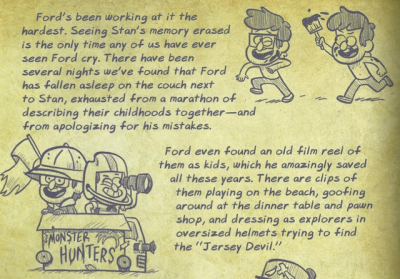
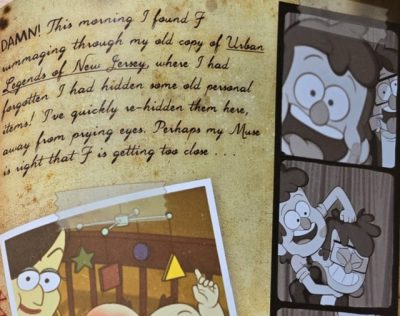
And a picture of teenage Stan (as seen below), too! You would think he would just attach himself to the idealized version of baby Stan in his head to feed his nostalgia and completely ignore teenage Stan, the traitor, the one who destroyed his science project. But no, Ford wouldn’t be Ford if he acted consistently about Stan. The funniest thing to me about the ripped yearbook page is that it implies Ford made the conscious decision to include Stan as he ripped the page off, when he could have just focused on his own picture. And then we also have his drawing of Stan, a perfectly accurate portrayal of Stan’s face as he got kicked out, implying that not only he paid an enormous amount of attention to his brother and how he looked like back then (after he closed the curtains), but that particular image was living rent free in his brain. Very vividly. With details.
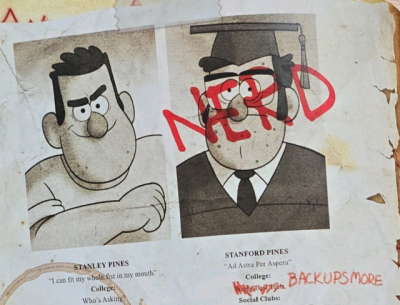
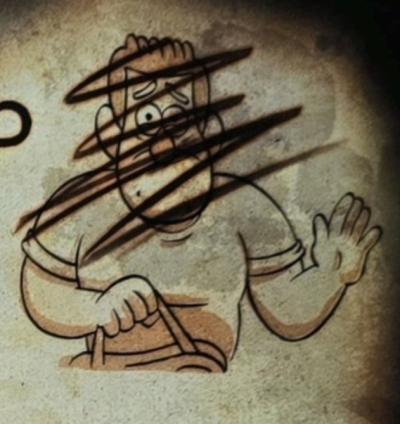
Now, folks, do we have any doubt whatsoever of the power Stan had in Ford’s psyche? Seeing that this is how the bedrock of Ford’s mind looked like? The boat, the swing set? I’ve seen it suggested before that these items represent Ford’s greatest regrets—I don’t know if I fully agree with that take, seeing as the swing set is fully intact, unlike in Stan’s mind, but one thing is true: they represent what Ford deep down thinks is most important, and two of three are directly related to Stan. Even the portal, from a certain angle, is connected to Stan.

Now, another thing that I believe to be related to that, is the claim that Ford didn’t spare Stan a single tought in the many decades they went separated. But here is Ford, casually confessing that he spent the last thirty years thinking of Stan:

But back to pictures. According to Alex in the commentary of Weirdmaggedon 3: Take Back the Falls, that picture of Stan has always been in Ford’s coat pocket, through all the decades, even before Bill’s betrayal. That’s why it’s so damaged. He was dimension hopping with it. I don’t think I even need to make any comment here, hahah.
I almost imagine if McGucket found that photo in his, you know, coat while they’re working on the portal or something... [imitating Fiddleford’s creaky voice] “What’s this? What’s this here?” And Ford says, [imitating Ford’s deep, very serious voice] “OH, yes. That’s a very important moment, that’s when I, um, first decided I wanted to be an adventurer.” [...] There would be NO reference to... the real reason he’s keeping it [...]. “Oh yes, this is about, uh, science, as a horizon, as a frontier to reach towards. You know, like a boat, like a ship, like science. It’s about SCIENCE!”

Ford’s protectiveness:
Stan Pines is very much ones of Ford’s weaknesses. Ford knows this and accepts this with shocking ease. How so? Well, first of all, the nightmare he had. As he tells us about it in Journal 3, even though he attempts to make light of the situation, his hand is clearly trembling as he writes, making drops of ink splatter on the page. The climax of his nightmare, the peak, the scariest moment was when Ford realized he was not the one at risk; rather, Stan was. “I realized my hand wasn’t chasing after me at all—it was chasing after my brother, and it was going to squeeze him to death!”And then, may it be noticed, there was no hesitation whatsoever on Ford’s part about whether to save Stan or not, nor does he try to hide his protective reaction. It was immediate and instinctive. “I tried to run to help him, but my feet were frozen.” It’s very telling that the Dream Hipster, the nightmare inducing ghost, thought that Stanley Pines would be the most effective thing to make Ford shake in his boots. Not even, say, failing and being ridiculed by other scientists, considering how ambitious he was.

And you know who else has noticed this weakness? Bill Cipher, of course. After psychologically, emotionally, and physically abusing Ford in horrific manners (including but not limited to: forcing him to eat spiders, driving a nail into his hand, and making him wake up on the snowy roof of the Mystery Shack as a symbolic threat of forced suicide), Bill involves Stan, as the grand finale. “But then he crossed a line.” Why was Ford’s brother that line, after everything Ford himself went through? “No. He wouldn’t.” Ford couldn’t even believe Bill’s audacity in involving Stan, even though he very much already knew Bill was as evil as evil could get. Because Bill knew, having free access to Ford’s mind, how terribly important Stan was: the person Ford loved the most in the world, more than himself.

You could still argue, then, that Ford wasn’t very protective of homeless Stan. After all, how could he have allowed his brother to be homeless in the first place?
Simple: he didn’t know. There’s a lot of things about mullet!Stan that Ford didn’t know! From canon, namely TBoB and Journal 3, we can deduce that Ford didn’t think of him as homeless, thought he was doing well for himself, living a well traveled charlatan/adventurer’s life, perhaps even a friend/member of the mob:


As Stan was kicked out, he told Ford (and the rest of the family), “Fine! I can make it on my own! I don’t need you! I don’t need anyone! I’ll make millions and you’ll rue the day you turned your back on me!” The way I see it, Ford took that at face value. Stan didn’t seek Ford out in those ten years, either, presumably out of a mix of pride, shame and self-hatred, so Ford could only assume Stan truly didn’t need him. Despite the many, many crossed out mentions of Stan in Journal 3, I think Ford at least tried to not let his mind linger on thoughts about Stan too much, because that hurt.
In his most recent interview, by HanaHyperfixates and ThatGFFan in 2023/2024, Alex talked about Ford’s issues:
He’s aloof, and distant, and he’s too perfect. And it’s like, “oh! I think he’s also aloof and distant from himself.”
I think he is, uh, deeply deeply hiding from his real feelings about things, because at some point early on, he decided that he could run from hurt by achievement and by creation, and has dug that hole so deep that he has no relationships.
If he sees achievement and creation as distractions from his real feelings, no wonder Stan didn’t get a call (or a postcard) from him earlier.
We also have Ford’s condescending, but protective, attitude towards Stan in TBoB as he considers asking for his help. Condescending protectiveness, if you will:

Notice how Ford briefly looks at Stan when Stan rants about his life:

A very ☹️ face. He’s probably surprised and concerned about what he’s hearing.
And then Stan, unfortunately but understandably, starts insulting/accusing him of selfishness:
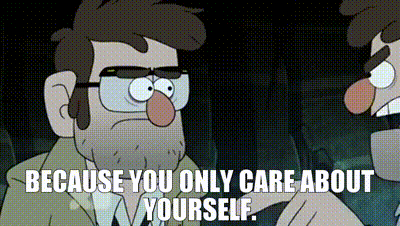
You can notice the ☹️ face slowly becoming 😠 as Stan started attacking.
Again, when Ford accidentally hurts Stan by branding him:
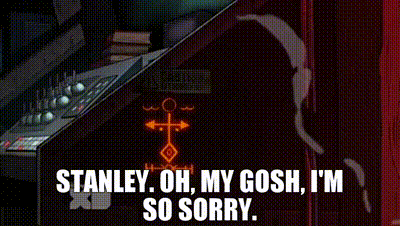
That’s not even ☹️ anymore, it’s almost 😩! Things would probably have deescalated and perhaps even been fixed if Stan, unfortunately but understandably, hadn’t punched Ford in the face as retaliation.
“Oh, but what about old Ford kicking Stan out after everything, then?”
I think a lot of people who talk about this moment operate under the assumption that Stan was, well, completely and thoroughly screwed if Ford followed with his original man. An old man, no place to go, no money...
But Stan did have money. A lot.
No, really, he had, per his own words, in the extra commentary of Land Before Swine:
I do have a son, Benjamin Abe Hamilton Washington. This pile of money I’ve collected over the years! That’s my true family. Y’know, I can sorta glue it together into the shape of a child, maybe… Eh, I dunno. I do my best, right? And I do have—I do actually—not to brag, but I have an obscene amount of money. Uh, y’know, all the years of collecting and etcetera—and also grifting!
I’m not defending Ford’s actions here. Ford is my favorite character, but I’m not a Ford defender, hahah. You could still argue that what he did was an ungrateful, jerky move, and I would agree. I’m just against painting it as a “Ford doesn’t care at all about Stan’s safety” moment. Especially because, when Ford told Stan he wanted his house back, sufficient time had already passed. Enough for Ford to change his clothes, visibly, and enough for them to have had a talk, in which Stan could have revealed this little fact about himself.
Another thing I’d like to address is that Ford doesn’t hesitate at all to save Stan when he gets into trouble and acts natural about it, which is way more that we can say for Stan (as seen by how Stan reacts when Ford is kidnapped by Probabilitor the Annoying and when Ford is turned into a golden statue by Bill):
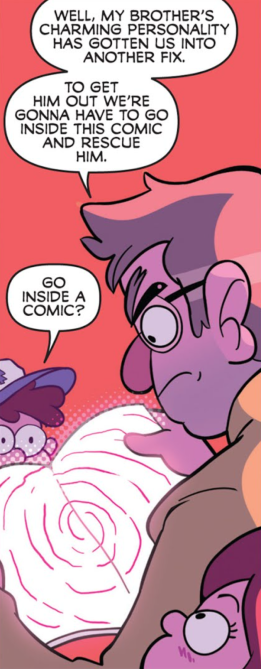
Again, not saying that Stan wasn’t justified in not wanting to help/save Ford after Ford’s blatant ungratefulness (I’m also sure he didn’t know Bill was actually torturing Ford). Not the point.
Now, back to Bill.
What I always loved about his little victory moment in Weirdmaggedon 3: Take Back the Falls is that upon surprising his enemies with his appearance, he proceeds to turn everyone into tapestry, including even Fiddleford (whom we know Ford cares a lot about!) but forces himself to spare Stan and the kids and place them inside the cages, even though they didn’t know the equation and would have zero usefulness to him. That could only be because he thought he could use them against Ford, so Stan was obviously included (instead of turned into tapestry or outright killed) for that very purpose. From a Doylist perspective, of course they couldn’t have excluded Stan, since he was one of the main characters; for the sake of character analysis, though, this is the best explanation in-universe.

That is why, when Stan-as-Ford tells Bill, “My only condition is that you let my brother and the kids go!” Bill easily believes him. Because he thought that it would be in-character for Ford. And Bill wouldn’t be wrong, not at all. He wouldn’t, because Ford himself was the one to tell Stan, just a moment earlier: “We need to take his deal. It’s the only way he’ll agree to save you and the kids.” It’s blaffling to me how many fans seem to forget Ford’s own words, and the fact Ford was very, very much willing to damn the whole universe (with seven billion people living on Earth at the time) to save three (3) people, including Stan. That Stan himself was the one to oppose and stop him. I think that happens because people buy Ford’s facade of Cold Responsible Greater Good Guy, which couldn’t be more deceiving. At this point I’m begging you guys to look deeper!
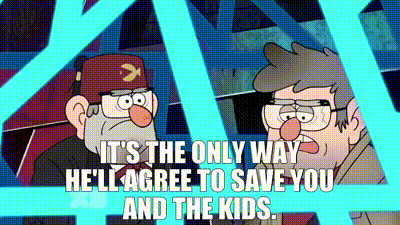
One common misconception about Ford’s character—not only Ford, but many, many fictional characters I have had the pleasure of considering blorbos—is that people take his facade at face value and judge him based off that. You’re falling for his bullshit. You’re looking at Ford and seeing exactly the man he wants you to see, instead of the man he is.
Ford demonstrated being hypocritical many, many times through the show, the comics, his journal, and even TBoB. I would go so far as to say it’s a Known Personality Trait of his. He chews Stan’s ass for being selfish, reckless, a criminal. Then proceeds to be: selfish and completely unaware of it, ten times more reckless, and a much more dangerous kind of criminal. He reproaches Stan for risking the world for only one person, but would have done the same thing.
Now, the last point of this particular subject: Ford and the erasing of Stan’s memories, which is sometimes interpreted as Ford prioritizing the greater good, or the kids’ safety, over Stan.
Dear reader, Ford erased Stan’s memories because he had literally no other choice. This is what Ford said to him: “He’ll be able to take over the galaxy and maybe even worse, but at least he might let the kids free.” Emphasis on the might, here. Might! Perhaps! Maybe! Perchance! Ford, in this line, was referring to Bill’s immediate threat to the kids’ lives—Bill had, after all, ran after Dipper and Mabel with a terrifying threat of disassembling their molecules as their grunkles were forced to watch inside their cage, powerless to stop him. After reflecting about their whole situation, he included Stan’s safety in the deal, too, now more certain than ever about his decision to sacrifice not only himself but, in his own words, “the galaxy” (and later, “the universe,” as he was pretending to be Stan) to, again, perhaps (!!!) save his family. Ford had literally no guarantee Bill would follow through with his words. Given Bill’s track record, it was way, way more likely that he wouldn’t. Bill is a liar and a manipulator through and through, one who takes great enjoyment in people’s suffering. Ford’s suffering, specifically, above all, since TBoB painted Bill as this toxic and possessive ex obsessed with his pet scientist. What were the chances?
Even if Bill, through some miracle, did end up keeping his word, we saw Bill’s plans for Earth in his daydream fantasies: taking a bite off the planet, drawing a smiley face on its surface as millions died... What a guy, that Bill! If the Earth was wrecked beyond repair, where would Stan and the kids live? How would they survive among all the chaos and destruction of the literal apocalypse? With nightmarish creatures lurking in every corner? With what food, what water, what shelter? Answer: they likely wouldn’t. The probability of human survival would be abysmally low.
Ford, tragically, had no other choice but to sacrifice Stan’s memories. It was that or risking the possibility of having to watch his family, including Stan, die horribly painful deaths at Bill’s sadistic hands or to condemn his family, including Stan, to a slower but still certain death after the entire human race perished.
Ford being aware of his love for Stan:
I have faith that most people already knew, to some extent, that Ford never stopped loving Stan, even at his angriest. A much lower percentage of these people, I believe, know that Ford himself was very much aware of that, and not in denial at all. He never even thought he hated Stan.
First, I choose to point out how young adult Ford, still in college, with his bitterness and resentment still very fresh, admits to missing Stan. He wrote, “MISS YOU” in their Bro Code, the code he memorized and never forgot. He not only thought about Stan, which would be understandable, since all of us have intrusive thoughts, but he took the time to write it down, and in code, which would be even more difficult than just writing it in English. That requires at least some level of acceptance. You may not be able to filter your thoughts, but you are able to filter your writing.

Ford does attempt to filter his writing, I know, by crossing out a lot of lines in Journal 3, most of them about Stan. But he does not cross out all of it. He freely admits to having a nightmare about Stan, to wanting to protect Stan from the giant six-fingered hand, to having the lake as his favorite place, to missing Stan. I think that Ford, if asked about his love for Stan back then, would also freely admit to it, as well. Stan is his twin brother, so of course he loves Stan.
One thing that always caught my attention is how Ford still refers to Stan as his “family” in the Journal, even after Stan’s attempt to disown him. Stan makes it pretty clear that, from now on, his “family” is just Mabel and Dipper:
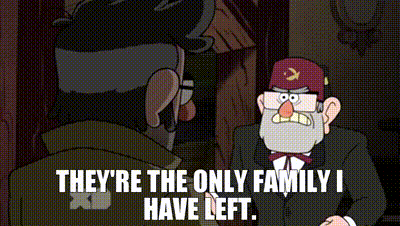
Days after this, Ford didn’t seem to have taken this to heart, as seen by what he wrote in his Journal:

It’s way more likely than not that he IS including Stan, here. He says “the rest of the Pines,” instead of just “the children” or “the kids” or “the twins,” and even singles out Dipper as someone he trusts (contrasted with Stan and Mabel, whom he doesn’t).
I wonder if that’s just Ford being stubborn or if he really thinks his relationship with Stan is in a somewhat better place than it actually is.
I mean, for instance, this is their swingset (symbol of their relationship) in Stan’s mind:

And here it is Ford’s mind:

Still ominous, but very noticeably intact.
It’s ironic—I think that Ford was aware of his own love for Stan, but not aware of how damaged their relationship was from Stan’s POV.
Ford and stubborness:
I’ve also seen people saying that, if Stan hadn’t sacrificed himself, Ford would have continued, quote unquote, “hating” him. Or that his happy ending with Stan was a byproduct of his guilt over the same sacrifice, and not out of a genuine desire to reconnect with Stan. According to Alex’s commentary on this scene in Weirdmaggedon 3: Take Back the Falls, that isn’t true, either:
This whole sort of conclusion here is—what we needed to happen in this scene was—we needed pressure to be at the point where Stan and Ford recognize their lifelong rivalry and Ford does a sincere apology to Stan. And almost more importantly, he acknowledges Stan’s intelligence. Like, he says, “you wouldn’t have fallen for Bill’s nonsense,” like, he recognizes his brother has a kind of intelligence that he doesn’t. [...] And even though it’s Stan who agrees to—“I’ll be the one! Erase my mind! It’s fine. It’s worth it.”—like, it’s a sacrifice for both, like, Ford at this point is willing to get his brother back and has to lose him again. Like, both of them were... just doing what they have to do here.

This means that Ford was already wanting to reconnect with Stan before Stan offered to sacrifice his own memories. His comment about how Stan wouldn’t have fallen for Bill’s flattery wasn’t just self-reproach or some comfort to Stan, but a conscious attempt to soften things between them.
Which also means Stan’s offer to sacrifice himself wasn’t actually necessary for Ford to forgive him (or switch the blame entirely, more like, and start blaming himself instead) but just came at the worst possible moment. It was too late for them, now.
Reconciling Ford’s love for Stan with his treatment of Stan:
Now, we arrive at the last problem, which is something I’ve seen a lot of people struggling with. How to even reconcile Ford’s love for Stan, something we see hints of again and again, with his treatment of Stan?
First, this infamous line in Journal 3, which is arguably the most vicious (towards Stan) Ford ever was in canon:

That’s probably also related to Ford’s control freak tendencies. If Ford admits to himself he is not in control, that he needs help from other people, that he is really that desperate... Well, he can’t admit that, so he rationalizes his way out of that conclusion by convincing himself he would be the one doing Stan a favor (offering him the chance to prove himself to Ford), and not the other way around. He doesn’t need Stan, he doesn’t need anyone; Stan is the one who needs him and his forgiveness. (This is the moment I get the urge to reference a manga protagonist with a very similar control freak mindset, Light Yagami from Death Note. Why am I always attracted to characters with deep cogntive dissonance issues who desperately shape their own narrative to convince themselves of their full control over it? Like a moth to a flame.)
Don’t get me wrong, I do believe Ford looked down on Stan—on people in general. There’s plenty of evidence for that in both Journal 3 and Word of God, if you count Word of God as evidence. Ford himself admits to that after Weirdmaggedon. And let’s not forget what is probably the biggest elephant in the room, the 2016 TVInsider interview (if you’re nerdy enough to read such a long meta, you’re likely nerdy enough to have seen this quote already):
In terms of Stan and his brother’s conflict, we always wanted a moment where Ford saw that he was wrong. Ford’s spent an entire life imagining himself as this lone solitary hero and imagining his brother as this bumbling leech. From a narrative point of view, for Ford to see Stan be the hero finally lets Ford see the true side of his brother that he’s been too blinded by pride to see.
Ah, yes. Ford looking down on Stan enough to think of him as a “bumbling leech.” To most people, this sounds way harsher than “selfish jerk,” the term Ford himself used in Journal 3.
Fittingly enough, that was in the same interview Alex said Ford would have deserved to lose Stan:
If Stan had lost his memory for good, that would [have] provided some interesting narrative places for him and his brother to go, but ultimately the show is about the kids. Stan and his brother are meant to be a parable [that show] what can go wrong in a family relationship, [but also] show that, with hard work and sacrifice, the riff can be repaired. If Stan’s memory had been fully erased, it wouldn’t punish him so much because he’d be gone, but it would punish Ford, Dipper and Mabel most. Even though Ford might deserve that punishment, Dipper and Mabel do not.
The interesting thing here, though, is exactly that: losing Stan would be a punishment to Ford. Why? Because it would hurt. Why? Because Ford loved him. Enough, it seems, that he would suffer more with it than Stan himself would.
I think what confuses people so much is that they conflate love with like with admiration with trust with respect. They think of it as the same thing—a confusing, amorphous mass of positive feelings towards someone.
The way I see it, though, Dipper was someone Ford loved (considering love a deeply rooted, complex emotion), liked (felt general fondness/amiability towards), and trusted (to be capable of handling all the mystery stuff). Mabel was someone he loved (she was family), liked (she was weird and creative and pure-hearted!), but didn’t trust (due to his constant projecting; before anyone attempts do deny this, I’ll remind you that Ford himself admits in Journal 3 that Dipper was the only family member whom he had come to trust). Stan was someone he didn’t like nor trust, not anymore, certainly didn’t admire and—let’s be honest—barely respected (or didn’t respect at all, depending on your point of view), but still loved with the fierce intensity of one thousand suns.
I do believe Alex is at least mindful of the difference between love and respect, as seen by his commentary on Stan’s condescending love for Mabel in Land Before Swine:
But this idea that Waddles is sort of a metaphor for what Mabel loves. And Stan loves Mabel but he doesn’t—he doesn’t really think that anything she thinks is necessarily smart or right. You know, he loves like her, ah, she’s my sweet niece, but [Stan’s voice] “she doesn’t know anything.”
In the same interview by HanaHyperfixates referenced earlier in this post, Alex revealed his view of the Stan twins’ relationship:
Those characters at sea—it was so rich. They’re really really funny, because they both have major major blind spots. I can kinda write stories about them as a duo forever, because you can always excuse them both getting hyped on a bad idea for their own reasons, and then you can always come up with a reason for them to disagree about it, and it’s always sweet to see them come together again, because they’re so full of themselves, but they are also both so damaged they desperately need each other.
As you can see, the codependency is genuinely mutual, not something imposed on poor, guilty Ford after Weirdmaggedon. One thing I find really interesting about Ford is his black & white mindset, the fact that the only way he knows how to be with Stan is a codependent way. They’re either separated and estranged or sailing completely alone on a boat for the rest of their lives. Either rivals or best friends forever. There’s no middle ground for him.
Dipper tells us in Journal 3: “Still, it’s taken about a week of intensive scrapbook therapy to get Stan fully back to himself. [...] Ford’s been working at it the hardest.” Ford was the one putting the most effort in getting Stan back. Despite all, I believe Ford is the person who loves Stan the most. Not the one who loves Stan better—that one would be Mabel, I believe, or Soos, who are non-judgemental and understanding. But Ford is the one who loves him with the most intensity, which is fascinating because for most of the show he doesn’t even know how to love Stan, as exemplified by his treatment of him. Too fierce, too selfish, too much of everything.
Was Caryn Pines a good or a bad mom to the Stan twins?

Stan introduces us to Caryn’s character by describing her in the following words: “Mom was a pathological liar, which served her well as a phone psychic.” She is also, canonically, a kleptomaniac. “Pathological liar” and “kleptomaniac” aren’t the first terms you think of when you picture a stereotypical housewife back in the day, are they? So that’s already proof she can’t be put in a box together with the “women of her time.”
Let’s get this out of the way: she does not fear Filbrick and people should stop using that as an excuse for her actions (or lack thereof). But she isn’t totally uncaring, either. I present you a canon analysis of the relationship between Caryn and her kids under the cut!
Usually, the possibility of Filbrick being abusive towards Caryn is a headcanon born not out of any canon evidence, so to speak, but specifically the need to excuse Caryn not intervening as Stan was being kicked out, even though she watched it happen, just as Ford did. However, this is not what we see in the comics:
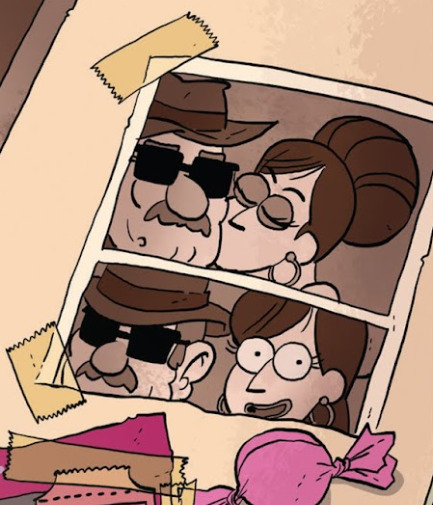
Caryn initiating the kiss/affectionate physical contact, and smiling brightly and genuinely to the camera.
And, again:
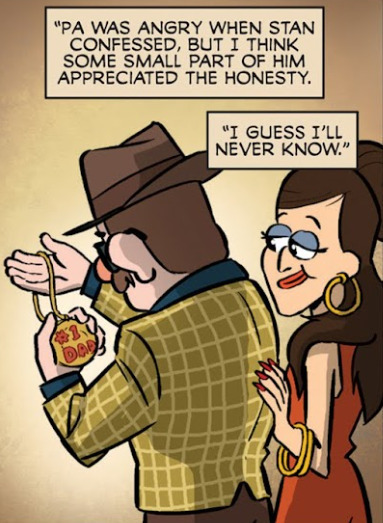
She’s presumably alone with Filbrick here, again initiating affectionate physical contact, and looking at him with an expression that can only be described as very tender.
In both panels, she doesn’t look afraid of him at all. Not even remotely. She knows the man she married and she loves him. I think this might confuse a lot of people given what we know of Filbrick, but in plenty of relationships irl, a man will hit his children and then turn around and call his wife affectionate pet names; an abusive parent will see their children as beneath them to discipline as cruelly as they please but see their spouse as much more of an equal in the family structure.
I know a few of you might be thinking that these two panels don’t represent the totality of their home life/the relationship between Filbrick and Caryn. After all, there is abuse in “loving” marriages as well, right? It’s a complex situation. And I would agree with you, if we were talking about real life instead of a cartoon. Gravity Falls is a cartoon and all its characters are fictional and 2D, lacking the complexity of real humans—what we know about them is what is shown to us by the writers, and what is shown to us is intended to represent the characters in their totality and dictate how the audience should interpret them. We’re meant to fill in the gaps using what is offered to us as a basis. While you are free to headcanon Caryn as being abused by Filbrick, it doesn’t have any canon evidence to back it up, simply because the writers did not mean to imply that. If they did, she would have been written differently.
Take as an example Mrs. Gleeful (Gideon’s mom), who, despite not being abused, seems plenty terrified of the events happening around her:

The GF Wiki describes her as “paranoid, traumatized and disturbed” right off the bat. It isn’t subtle at all, because it’s a cartoon. Caryn, on the other hand, doesn’t show the barest hint of fear. On the contrary, they make a point of showing her happy with her husband and her family, overall.
When I focus on a Watsonian approach, I sometimes wonder if Caryn might not have been intended as a questionable mother, but that a questionable mother was simply the woman we ended up with given the writers’ lack of thought about their side characters and/or struggle to write female characters compared to male ones. I’m not entirely sure about that, though; a friend once pointed out Filbrick and Caryn are exactly the kind of parents you would expect the Stan Pines you knew up to AToTS to have, intended to sort of explain the two sides of his personality to the audience: a father packed to the gills with toxic masculinity and a lying, cheating mother. One thing I’m certain was intended, though (and if Alex ever releases canon material retconning this fact, it will be just that: a retcon), is that Caryn does love Filbrick.
In conclusion, she probably didn’t want to leave or divorce Filbrick, either. Not because she couldn’t or was afraid to, but because it was her choice to stay with him.
Now, can we blame her for that? That’s complicated too, I believe. I don’t think that physical punishment, even if severe, would be automatically be seen as abuse or anything of the sort in whatever period their lives took place, 1950s or 60s (Alex is insistent on the fact the show isn’t supposed to have an actual timeline, but an “emotional” one). I think this can be applied to a lot of other behaviors. I’ve seen many older adults saying, in my country, that “back in their day” an adult could silence their child with just a single look, just by raising their eyebrow. I don’t know how things were in the USA, but I bet kids were expected to be more “respectful” and “obedient” and a lot of what would be considered abuse nowadays was then considered an acceptable way of raising a respectable citizen. So Caryn, too, might have interpreted her husband’s behavior as his way of “toughing up” the boys.
I personally headcanon (emphasis on headcanon! I always keep headcanon and analysis neatly separated, and we’ll soon return to the analysis) Caryn as having Stan as her favorite. Most people with siblings seem to think there’s always a favorite one for each parent, and we know of her canonically being affectionate with Stan! She’s the one who says he has “personality,” who calls him her “little free spirit,” who asks about him to the principal when Ford himself doesn’t. She’s one of the only two people who attend his fake funeral, according to the TBoB site, and the other person was an IRS agent. On the other hand, we know virtually nothing about her feelings for Ford in particular/specific, other than the fact she at the very least doesn’t feel negatively about him—no nicknames, no praise, not much of anything. I like to think Ford is not disliked, but Stan is her baby. It makes sense to me because Stan was a talented and creative liar, like her, while she couldn’t relate much to studious Ford. (It’s also fun to give Ford mommy issues, hahah. It would be pretty ironic if, while Stan is confessing to Ford about how upset he feels that Ford is Filbrick’s fave, Ford was internally harboring similar suspicions towards their mom.)
Back to the analysis—these are the two instances in which we see her acting as a mom, in TBoB and the comics respectively:


In the first picture, she’s smiling at the camera with one of her babies crying in the background. In the second, she doesn’t seem very bothered by the fact her troublemaker kids are “sneaking out” (very probably so Filbrick doesn’t see them) to “fight the devil.” She doesn’t even ask for more information or scolds them for climbing down a sheet from their window (when they could easily fall and get seriously hurt), just tells them to be back home by dinner.
I think she did love them in her own way (she wouldn’t have been one of the two people to show up to Stan’s fake funeral otherwise, since there was no benefit in doing that), but that way of hers was clearly not the stereotypical, overprotective, nagging, fussing mother hen way. I see her characterized as some sort of Mrs. Weasley from Harry Potter far too often (probably because people have an idealized concept of How A Good Mother Should Behave in their minds, and with the lack of canon information about Caryn, that’s the default set for her), when truly her style of parenting seems closer to Grunkle Stan’s style of grunkling.
As an example, Stan smiling and reassuring himself as the kids fight like crazy in the background:
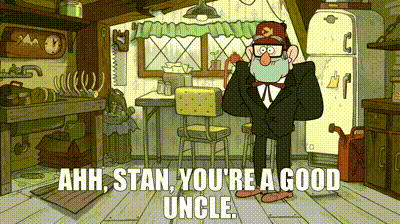
Except, of course, that she was a woman and didn’t have Stan’s weird hangups about masculinity, so she wouldn’t shy away from being more openly affectionate, cooing, praising.
Except, also, that she didn’t intervene when her kid was kicked out, while Grunkle Stan, who does everything for his family and is unflinchingly loyal to it (even to his own detriment), absolutely would have intervened in her place.
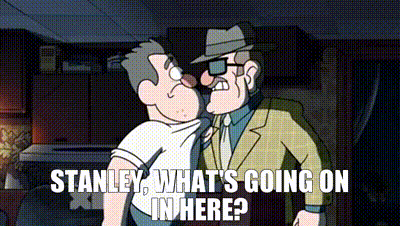
She sounds confused, a bit concerned, but again, she was not afraid to make her presence known and walk into the scene and ask what was going on as her husband was visibly very angry. Her tone is not of a panicking or scared woman.
Then, Stanley calls for Ford to defend him, not her. Ford, his brother, same age as him, who was at the moment beyond furious with him and very unlikely to show any compassion. Ford, whose attempts to change Filbrick’s mind would more likely than not have been unsuccessful. Not Caryn, adult, who probably had much greater sway over Filbrick. They say a child’s first instinct is to call for their mama. Clearly not in this case!


I’ve seen many people headcanon that Stan kept in contact with her, or else Ford couldn’t possibly have known Stan’s address. I think they might be forgetting the magic omniscient Mailbox! That’s my own headcanon to how Ford managed to get it. (Frankly, I don’t think the writers thought too much about it, so I doubt there’s an official explanation; if there is one in the future, it’ll be a retcon for sure. That’s how GF works.)

Think of Stanford Pines’ character and how he operates, how he always avoids asking for help, how self-sufficient he always attempts to be. He has two options: one involving phoning his mom and asking for his twin’s address and fueling gossip/assumptions that he was ready to reconcile with Stan, and another one than involved just Ford himself and supernatural/magic means, like an old, magic mailbox. Which of the two is more likely to be his choice, especially in his paranoid state? (And speaking of the mailbox, Ford wouldn’t necessarily have had to ask it about Bill’s weaknesses. By the time he needed Stan’s address, he had already tried using many of Bill’s canon weaknesses against him and failed, so he wasn’t struggling due to lack of knowledge.)
When Bill threatens Ford, he says no one would miss him if he died out there in the snow, which implies that, at least from Ford’s point of view, that would be believable (since Bill wouldn’t brag about something absurd and meaningless but something that he assumed could actually hurt Ford):

Bill mentions, in that order: Fiddleford abandoning Ford, Filbrick not wanting Ford to return without millions, and Ford’s lack of friends. No mention of either Stan or Caryn. If you want to be more charitable towards Caryn, perhaps this is Bill refusing to remind Ford of any person that could possibly love him. Even then, Ford’s mind doesn’t immediately go to Stan (presumably because of their fight) nor to Caryn (presumably because of Ford’s estrangement from his family) as a denial/protest against Bill’s words.
Ford also admits he had abandoned their family to become a recluse:

Caryn was very likely included in the “family” he felt like he had abandoned.
I’m not saying that Stan wasn’t keeping in contact with her, but that if you choose to think he was, that’s also a headcanon. I personally can see it, since Stan is a character who always prioritized family above all, while Ford was growing increasingly isolated and estranged from them.
Ultimately, when it comes to Caryn, I think her character depends a bit on Filbrick’s. The worse you headcanon Filbrick to be, the worse it looks for her as a mother. Fortunately for her in my case, I don’t headcanon Filbrick to be a stereotypical monster that beat his sons black and blue all the time. I think he sucked at parenting, but not exaggeratedly so, and in a way that could still be socially acceptable back then.
Meanwhile, in the fandom, I think there’s a tendency to portray Filbrick as Terribly Bad and Caryn as Undoubtedly Good, demonizing one and idealizing the other to the point you stop and wonder: how did this wonderful, perfect woman even marry this man? I believe the black & white extreme contrast is appealing, in a poetic sort of way—a helpless saint stuck with a monster—but not that realistic considering their situation.
It’s also more comforting to imagine her as extra motherly to compensate for the fact Filbrick was so terrible. Shermie also gets this treatment, in a way, being headcanoned as a very protective older brother that would often defend the twins from his father’s wrath. It’s just... sad to imagine our beloved blorbos Stan and Ford didn’t get much protection at all.
I don’t believe they were very protected, but I also believe that Filbrick also wasn’t that terrible. That time in which he attempted to “sell” Stan after he got a bad grade (according to the TBoB website), for example? I doubt he was actually selling the boy. Way more likely that he was humiliating the boy, which is obviously very, very bad, alright, but not to the levels of actual child trafficking.
I actually can see Caryn intervening in certain occasions, telling her husband to chill, that this time Stan (his favorite victim, despite the fact Ford also suffered with his expectations in a different way) was innocent, that they were just kids, but not forcefully so. Not in an “insistently, angrily putting her foot down” way. You could, of course, also headcanon Filbrick was that terrible but threatened the boys so they didn’t tell their mom and Caryn remained blissfully unaware of the worst—if that’s your cup of tea. Even if she were unaware of the worst, though, there are things she surely wouldn’t have missed while living under the same roof as Filbrick and the Stans without plausible justification, so I wouldn’t abuse that excuse.
It’s also possible to me that she knew some of it and started deceiving herself and coming up with explanations to soothe her own mind, perhaps even dissociating a little. She wouldn’t want her Filbrick to be a terrible father, so she pretended that he wasn’t. This hypothesis, ironically, would give her a fitting similarity to her son Ford: the worst liar is the one who lies to herself.
I’m not a great fan of the idealization of Caryn as a mother because that’s somewhat sexist to me. You know, how mothers are definitely treated differently than fathers, and often put on a “can do no wrong” pedestal with higher expectations? Society often forgets that women with children are people first, mothers second. I think it’s possible for a female character that is also a mom to be a good character but not that good of a mom. Caryn, imo, gives off more cool wine aunt vibes than she does motherly momma.
But we know that, despite her shortcomings, she does cherish her family.

Stan and Ford probably have many fond memories of her, such as this one in TBoB:

At least we can assume that, despite her husband’s idea of a Hanukkah present being actual cinder-blocks, which Ford felt the need to mention to the reader, Caryn herself must have gotten them more decent/normal gifts with the budget they had.
Or here, in J3, where we can probably assume Caryn was included in the “family” that attempted to comfort Ford about his extra fingers (I can’t imagine Filbrick being this sentimental):

She is also described as a “caring mother and kleptomaniac” on this Lost Legends website that I believe few people know about the existence of (the same that revealed her full name to be “Caryn Romanoff Pines”), but considering Alex’s acidic/sarcastic tone I don’t know if we’re meant to take the “caring” adjective very seriously. Especially because he has said before, in the DVD extras (AToTS commentary), that Stan attempted to get from the public “the affection he never got from his family and lost with his brother.” (Such statements seem conflicting with each other, so I prefer a middle ground approach.)
Narratively speaking, I believe she loved her boys and her boys loved her, but not enough to take away Stan’s protagonism in Ford’s life and Ford’s protagonism in Stan’s life. They’re meant to rely mostly on each other, to the point Alex confessed in HanaHyperfixates’ and ThatGFFan’s interview that he didn’t elaborate on Shermie’s character because Stan & Ford were meant to part of a duo against the world and an extra sibling would alter that dynamic:
In terms of Shermie, I remember asking Rob or somebody at some point, like, “Would Shermie be here, logically? Do we have to see him?” I don’t really wanna see him. I’m not interested in that. I’m interested in Stan and Ford being—sort of having only each other and then losing each other because of their different life paths.
I think the suggestion was, “Maybe Shermie would be a baby. Maybe that would happen.” And being like, “okay sure.”
That said, I also believe people don’t get that. I’m tired of this being my experience in this fandom:

(Sorry, I had to include a meme.)
She’s excused for not intervening that night even as her seventeen-year-old son, Ford, is not extended the same courtesy. She’s also often put on a pedestal for... being present at her own child’s funeral? It’s ironic how, despite her fanon self being idealized by the fandom as mothers are idealized by society irl, her canon self is treated by the fandom as fathers are treated by society irl: the bare minimum becomes cause for celebration.
It might sound like I’m being too harsh on her, but I didn’t write this to attack Caryn. On the contrary, I think it’s very, very nice that her character is so difficult to pin down, as either a fully bad or a fully good mother. She has nuance, imo, and that’s a very delicate trait for any fictional character to have because the fandom never handles it well. Why? Fandoms in general prefer drama over nuance. (I’ve seen the contrary happening, too: a few fans getting so fed up with fanon Caryn that they decided to write her as completely uncaring.)
Ultimately, my own answer to the question posed in the title is: neither, but at least she (probably) loved them. Reading all of this, different people might have reached different conclusions, deeming her as either good or bad. That’s just proof, imo, of how hard it is to crack her. Good for her.
Stan twins: codependency & identity issues

“I tell you it’s unnatural for siblings to get along as well as you do,” says Stan to Dipper and Mabel in Not What He Seems, clearly missing his own relationship with Ford before things started to change. “We used to be like Dipper and Mabel,” says Ford in Weirdmaggedon 3: Take Back the Falls. Were they really, though?
I think what many people don’t get about Stan and Ford’s dynamic as children, or even as teenagers, is that, no matter what Stan and Ford think or say about it, they were not like Mabel and Dipper. That just highlights their lack of self-awareness. Here’s a canon analysis for anyone who cares to understand my point:
Mabel and Dipper have overall very different interests and hobbies and act separately on them. They have other friends and spend time with them—well, at least Mabel has Candy and Grenda, as the bubbly social butterfly she is; Dipper, on the other hand, seems way more preoccupied with deciphering the mysteries of Journal 3, but doesn’t miss an opportunity to be included in Wendy’s cool teenage group, as seen in episodes The Inconveniencing and The Love God (in the latter, he seems to be actually succeeding). As fraternal twins of different genders, no matter how alike they look (and despite Mabel’s joke of being “girl Dipper”), they still manage to retain pretty distinct identities. No issue here.
Mabel does her sleepovers, goes to boy band shows, and has encounters with potential crushes. When a surprised Dipper asks her about her vampire love in The Deep End, she points out, “I don’t tell you everything.” Dipper, meanwhile, explored the town with Soos, went to Wendy’s house, hung out with her teen gang, and overall lived many adventures without Mabel, such as trying to prove himself a man with help of the Manotaurs. I think the episode that shows the healthy independence Dipper and Mabel had from each other the best is probably Carpe Diem, inspired in Alex’s real life frustration with his sister, Ariel, but it can be observed all through the series:


What is shown to us in AToTS already differs from that. The Stan twins were inseparable, and each other’s only friends, as Stan establishes early on in his narrative: “Those bullies may have been right about us not making many friends, but when push comes to shove, you only really need one.”
With his question to Ford in the Lost Legends comic, The Jersey Devil’s in the Details, Stan implies they really did everything together, in a way reminiscent of Phineas and Ferb: “So what’re we gonna do today, buddy?”

Even small details, like the toys in their room, served to show the difference between the Stans and Dipper & Mabel, as Matt Chapman clarifies on the episode’s official commentary:
You also see that at this age, all the stuff that would cross over, that would appeal to both of them. You know, it’s not just like, oh, there’s science stuff here and then there’s like—I don’t know—what little Stan would be into. It’s like, no, they both like all this.

“But Mabel was just as desperate in Dipper and Mabel vs the Future as Stan was in A Tale of Two Stans!” Yes, true. She was, and I do believe her relationship with Dipper was the most important one in her life. But do you think the facts that a) she was already terrified of growing up, as shown in the episode Summerween, b) Candy and Grenda declined her invitations to their birthday party, c) Wendy showed her the apparently terrible reality of being a teenager, and d) Stan told her that it would be fine because at least she would always have Dipper... had nothing to with it? Originally her parents were going to forbid her from bringing Waddles to Piedmont, as revealed in the episode commentary of Dipper and Mabel vs. the Future, as just one more heartbreaking thing on the pile of Mabel’s Terrible, Horrible, No Good, Very Bad Day. (Of course, teen Stan’s circumstances were aggravated by the bad home situation he was being “left alone” in by Ford—just like Mabel! Whose parents were arguing, per TBoB canon, to the point of giving Dipper recurring nightmares.)
Another very important thing is that the poor girl was twelve years old, while Stan was presumably seventeen-ish, an age at which separation would be normal and even expected, with the time for college approaching. In fact, differently from what happened with Mabel, whose imminent separation from Dipper came out of left field through an unexpected proposal by Ford (foreshadowed only by her slight discomfort over how close Ford and Dipper were becoming), there was a blatant rift between the teen Stans that Ford went so far as to acknowledge to Stan’s face. Using Stan’s own words from the Land Before Swine commentary: “Anyway, cut to high school, the guy’s never kissed a girl, prom is coming up, and he asked me for advice. ‘Stanley, I know things have been a little weird between you and me with college, but can you talk to me about girls?’” That was before prom (the one in which a girl threw fruit punch at Ford), mind you.
And still, this is what Stan thinks when he realizes Ford is going to accept the scholarship: “Without Ford, I was just half of a dynamic duo. I couldn’t make it without him.” He saw himself as only half of a whole—no wonder, with the way both twins were pushed to believe this since their birth, when they were both named Stan.
When asked about Shermie, Alex observed that a crucial part of their dynamic is that they only had each other. No younger or older brother to support them. The quote from HanaHyperfixates’ and ThatGFFan’s interview:
In terms of Shermie, I remember asking Rob or somebody at some point, like, “Would Shermie be here, logically? Do we have to see him?” I don’t really wanna see him. I’m not interested in that. I’m interested in Stan and Ford being—sort of having only each other and then losing each other because of their different life paths.
I think the suggestion was, “Maybe Shermie would be a baby. Maybe that would happen.” And being like, “okay sure.”
From my own observations about their parents, that point is only driven further home.
Filbrick is, well, Filbrick. I don’t think I need to explain much here; every one of us has different interpretations and headcanons about him, but they seem to all agree on the common factor he wasn’t a good father—how much that can be justified by their time period or stretched to accommodate the most heartwrenching stangst is up for debate, just not a subject for this post.
Caryn is more complicated. I think Filbrick was definitely ‘worse’ than her, so to speak, at least in a more obvious way, and she has canonically demonstrated considerable fondness for Stan in particular—according to her, Stan’s rambunctiousness can be attributed to an excess of “personality,” he’s her “little free spirit.” She was, most notably, one of the two people present at Stan’s funeral if the info on the new website is to be trusted. We see her smiling brightly in the picture of the baby Stan twins included in TBoB, which hints at the fact she indeed liked her kids.
But the fact that she, as an adult, didn’t intervene when Stan was kicked out is simply, in my point of view, inexcusable. One could say she was momentarily paralyzed from an overwhelming fear of Filbrick, as a supposed victim herself, but a) that’s already entering headcanon domain, and b) I think that’s far from the truth and directly contradicting the comics, in which she looks happy and relaxed in the company of Filbrick: initiating contact and kissing him on the cheek, comfortingly stroking his back, looking at him with can only be described as tenderness... I don’t think Filbrick is meant to be seen as a monster, not in an exaggerated way. (He’s shown to be touched by Stan’s little stunt with the golden chain, too.) Just a really shitty father, in a common, boring, more nuanced, no less traumatizing, way.
Borrowing a paragraph from a previous analysis:
To me, the most telling thing of all is the fact Stan calls for Ford to help him, not his own mother. Ford, his brother, same age as him, who was at the moment beyond furious with him and very unlikely to show any compassion. Ford, whose attempts to change Filbrick’s mind would more likely than not have been unsuccessful. Not Caryn, adult, who probably had much greater sway over Filbrick. They say a child’s first instinct is to call for their mama. Clearly not in this case!


I’m not saying, here, that Caryn didn’t care about her boys. I elaborate more on her in the meta referenced above, here.
I find it adorable how easily, without any previous prompting, baby Stanley opens up to Ford about his feelings in the comics. The sheer vulnerability of this moment, seeking Ford’s reassurance that he wasn’t a bad kid; the implicit, profound trust, especially coming from someone like Stan, who grows into a man packed to the gills with toxic masculinity due to what he learned from his father. And the manner in which Ford gently comforts him, as if he were used to doing so. As Stan, too, had been shown to do when Crampelter mocked Ford’s fingers. They were clearly accustomed to being each other’s emotional pillars, in the way that kids who learned early on that they can’t count on adults or lean on the authority figures in their lives start building their own little safe space.


The way I see it, the Stan twins got along extremely well, for better or for worse. No obnoxious sibling bickering. No fights and conflict. How could they? They were literally each other’s only friend. If anything, their first major fight was caused by lack of communication, among many other things; they repressed their frustrations with each other to a ridiculous point instead of simply externalizing them like you would expect of an average sibling dynamic.
Second of all, they were monozygotic aka identical twins, as strongly hinted in the show, comics, and books, and as confirmed by Alex on the TBoB website, the behind-the-scenes DVD commentaries, and Twitter. The first mention of it, in 2015, below:

They were both named Stan, they had the same face. I’ve read irl identical twins’ confessions about the nature of such a relationship re: identity issues and how people tend to treat you, and it’s often not pretty. In the Stan twins’ case, their sense of identity was beyond blurry, and it’s not difficult to see why. If you pay attention to the show or the comics, you’ll see many hints of this unhealthiness: the way they were both called to the principal’s office (“Pines twins,” even though only Ford was an interested party), the way Stan was called “a dumber, sweatier version” of Ford by Crampelter, the way they had already pretended to be each other before, not in their childhood but adolescence (Stan’s idea, according to hilarious extra material in the DVDs).
Baby Ford, in the comics, has demonstrated a tendency to shoulder the blame that should only be attributed to Stan. For example, when he exclaims, “Oh my God! We killed the Sibling Brothers!” Ford, honey, if anyone had killed the Sibling Brothers, it would’ve been your brother, the person who shoved them in the first place. Not you.


I find it adorable that he also grounded himself for Stan! Filbrick had been very clear about grounding Stan, only, not both twins. But Ford stays with him as if he were grounded as well, as if he didn’t even have a choice. Where Stan was, there was Ford, not far behind.


They were an unit. Inseparable. As simple as that.
Until they weren’t.
The science fair incident happens, of course—and it’s worth noting Ford doesn’t consider the possibility that Stan sabotaged him out of jealousy or envy of his success for even a second! Instead, he immediately assumes Stan broke his machine so Ford would stay with him!
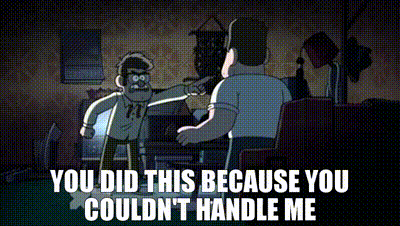
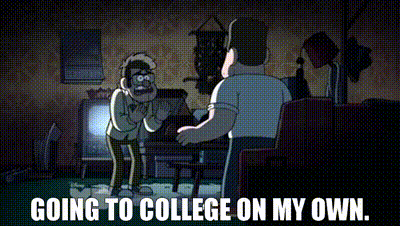
Did their codependency end with their separation, then? I’ve seen many people believing that yes, it did.
But mullet!Stan, now an adult, ten years after his fight with Ford, still resents Ford for not staying with him “forever”:

Not only that, but as Rob Renzetti (who is Gravity Falls’ supervising producer and story editor and the co-author of Journal 3) phrased it in this separate interview by HanaHyperfixates, Ford’s absence in Stan’s life haunted him and shaped all his relationships:
Um, I mean, to me that’s—I mean, really, Stan—Stan’s life has been… it’s been… sad, and lonely, since—he really… his brother was his best friend, and he loved him so, and I don’t think, you know, I don’t think any other relationship ever worked out for him, because of what happened between him and his brother.
And by the end of it all, you get Bill calling Stan “co-dependant” (British Bill?) on the TBoB website:

I know you might think, at first, that we should take Bill’s insults with a grain of salt, since he’s 1) Bill and 2) petty and desperate. But Bill has also a track record of trying to hit where he thinks will hurt the most, and he knows people. His insult here is not an isolated thing either. It might have been easily dismissed, I agree, if not for all the other evidence for the Stans’ codependency that I’m currently showing you. It’s just one proof out of many, just reinforcing an idea that’s already presented quite clearly.
If you’re still not convinced, Alex has revealed in HanaHyperfixates and ThatGFFan’s interview that Ford’s entire character was built around the type of person that could plausibility explain Stan’s neediness:
Ford was very much us building backwards. The same way you know a black hole is there by the light warped around it, it’s like, you know the damage someone’s family has done to them by all of their weird tics and behaviors. So who is the character who would result in Stan being this hurt and needy and mad and also longing?
But Stan’s codependency, imo, was always easier to see than Ford’s, to the point people mistakenly think Stan cared more about Ford than Ford about him. (I’ve dedicated an entire meta to debunking that assumption as well, here.)
In the commentary of Society of the Blind Eye, though, Alex added, referring to Ford and Fiddleford’s friendship:
Ford as somebody who lost Stan is kinda looking for—even though he rejected his brother, he kinda needs, he needs that other person, and he tried to find that in this kinda sweet prodigy and he just pushed him too far.
What Alex said about Ford’s relationship with Fiddleford can easily be applied to Ford’s relationship with Bill and with Dipper, since Ford needs “that other person,” needs to be one half of a duo. Ford has tried to recreate his dynamic with Stan again, and again, and again:



And then, of course, we have Ford’s proposal.
What’s really cool about this first image (below) is that it was drawn before Stan even accepted Ford’s proposal, and parallels their childhood picture in Ford’s pocket (one that, per Word of God, Ford has always carried with him, even before his portal days, as explained here) in a very obvious manner:


Ford was already excitedly fantasizing, drawing fanart of them together, picking their outfits and the name of the boat.
But more than that, he also says:
[...] I think it’s time for the Pines twins to join forces again. At least, I hope so. I haven’t discussed my idea with Stan yet. But if I know my brother, he will jump at the chance to find “money and babes.”
And this, to me, expresses both his hope that Stan would welcome his idea and agree to sail away with him and his almost certainty that it is exactly what is going to happen. Ford does mention Stan’s love for “money and babes,” but do you guys think Ford didn’t know what (or better yet, whom) Stan actually loved? In AToTS, Journal 3, and TBoB’s new canon material, we can observe that same certainty. In all three instances, Ford immediately assumes that Stan will show up and come for his call via postcard with no indication whatsoever that the possibility of Stan declining showed up in his mind.
Alex has also commented, in the first interview I’ve referenced:
Those characters at sea—it was so rich. They’re really really funny, because they both have major major blind spots. I can kinda write stories about them as a duo forever, because you can always excuse them both getting hyped on a bad idea for their own reasons, and then you can always come up with a reason for them to disagree about it, and it’s always sweet to see them come together again, because they’re so full of themselves, but they are also both so damaged they desperately need each other.
Not only reinforcing the idea that their codependency was—or at least eventually became—mutual, but confirming that things returned to their status quo. Ford has a black & white mindset, the only way he knows how to be with Stan is a codependent way. They’re either separated and estranged or they’re sailing completely alone on a boat for the rest of their lives. Either rivals or best friends forever. There’s no middle ground for him.


Some old fanarts of Stan and Ford, my art style changes very fast.
The one on the left was my first drawing of them i think(?

I didn't really like it, but the idea was cute sooo it deserves to be showed.



:333



From ig requests

THIS ONE IS EMBARRASSING FOR ME, but I spent so much time to finish it... I can't complain.

My masterpiece 🚬🚬🚬🚬
bill cipher...in 3D?? yeah, sorry guys I put him there...
Bill Rig is available on gumroad: https://mibbly.gumroad.com/
animated by my friend maya, im responsible for everything else. tag me if used, please. I pulled my hair making this

Idk what this is, but they look funny





















we go together



























the bond between an old man and his niece's pig
+ ford's reaction to stan getting his memories back



























(before y'all go "dreamscaperer!kid stan was actually ford", just note that he likely isn't wearing glasses here for visual clarity since they're wearing matching clothes and they didn't plan ford's actual character until writing tots)
While the kids are having fun, I decided to record my first circle on Telegram














you can see that the script originally had ford building an anti-gravity machine for the science fair (which i guess acts as foreshadowing to the portal?), but the sun lightbulb feels like it would've connected to the opening of stanchurian candidate....












getting a followup on stan's ponytail + friendly reminder that stan ends up growing out his hair





Weird old men in a weird country (and more spanish speaker Stanley)
People need to draw sea grunkles visiting their countries and getting in trouble with local cryptids, or just doing tourism XD







can you tell winter is my favorite season

did you guys ever drag your siblings on a blanket?

“Already tired of trying to recall when it all fell apart…I just want to love you well…I just want to learn how to somehow, to be loved myself - Sleeping At Last


Nothing new



The hell happened??



